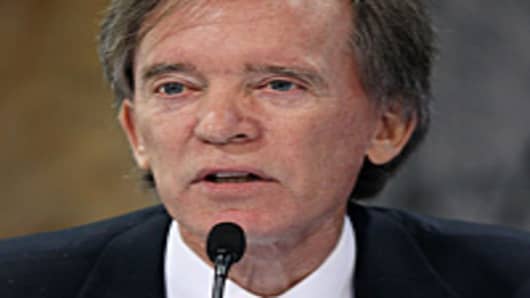Real action on the US deficit problem is unlikely until the 2012 presidential election, a stalemate that is helping to make the stock market a better bet for investors than Treasurys, Pimco's Bill Gross told CNBC.
Inaction on fiscal policy combined with real negative interest rates on most government-issued debt has chased Pimco from the Treasurys market, with the firm underweight on US debt and holding only shorter-term notes.
Yet Gross called market chatter that Pimco, whose Total Return offering is the largest bond fund in the world, is lagging because it missed out on a Treasurys rally a "misconception" and insisted that the firm, which manages more than $1.2 trillion in assets, is outperforming its peers.
"If we don't own Treasurys we own something else," Gross said, later adding, "I would simply say, we're having a great year. We love yields going lower because that means prices are going higher. It's the Treasury that we have a problem with in terms of their obligations and their credit quality in terms of yields."
Yields on Treasurys have remained low even though Washington lawmakers have made virtually no progress in addressing the $1.3 trillion budget deficit.
Negotiations between Republicans and Democrats on bringing the budget into balance have hit such a snag that there have been suggestions the US could temporarily defaulton its debt payments while negotiations continue.
Gross said that would send a "disastrous signal to the world credit markets" but would impact the dollar more than bonds, with investors turning to the euro and Chinese yuan instead.
"The dollar's the world's reserve currency. It's what we transact in," he said. "If the dollar is defaulted on for any period of time, what type of signal does that send to the rest of the world?"
Amid the uncertainty, Gross said Pimco is investing in debt from emerging markets such as Brazil and is in Canada, Germany and Mexico bonds as well.
Gross also said that when looking at yields of blue-chip stocks like Coca-Cola , Procter & Gamble and Merck compared to Treasurys, the equities are the "much more attractive alternative."
That will continue to be the case until conditions in the US change in terms of yield and fiscal and monetary policies.
"It's obvious that both Democrats and Republicans want to address the problems with spending and, yes, want to address the problem with revenue-raising," Gross said. "It's probably a few years away and debt holders will simply have to adjust to that stretch of a time span."
Bond investors likely won't take the news well, he said.
"Do they sit in relative stasis and hope? I don't think so," he said. "I think bond investors are vigilant."



